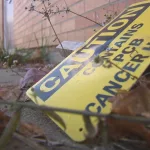
MONTPELIER, Vt. (WCAX) – Will state lawmakers pump the brakes on testing for dangerous chemicals in schools? The discovery of PCBs at Burlington High School three years ago led state lawmakers to create a first-in-the-nation testing, but the hefty price tag has prompted calls to pause the program.
Since PCB testing began two years ago, officials in the Caledonia Central Supervisory Union found the carcinogenic chemical in three schools, including the gym ceiling at the Cabot School. They didn’t have to close classrooms but they still don’t have a remediation plan or even funding to pay for one. “It’s turned into a real crisis in the public education sphere,” said Caledonia Central Supervisory Union Superintendent Mark Tucker.
The discovery of PCBs in 2021 at Burlington High School shook up the state’s education landscape. In Burlington, it forced students back to remote learning at home — and later to the refurbished Macy’s downtown — and prompted the complete demolition of the high school. The school’s replacement comes with a $165 million price tag.
The original testing plan tasked experts to test over 300 schools built before 1980. State lawmakers set aside $32 million last year for testing and remediation, half of that going to Burlington alone.
“For me, what comes to mind is the education loss that we experienced in Burlington,” said Sen. Martine Gulick, D-Chittenden County.
Since the PCB testing began, about 120 schools have been tested. Of those, about 40 have been found to contain some level of PCB contamination, which has led to some classroom closures. Some districts are spending big bucks on noisy air filters.
House lawmakers recently passed a bill indefinitely pausing the testing program. “For some, this has felt like an unfunded mandate. ‘You must test, you must test, mitigate, and then mediate.’ Where is this money coming from?” Sen. Gulick said.
But top Scott administration officials say a pause in testing is not the answer. “It doesn’t do anything to address the risk that we now know currently exists in many Vermont schools. It’s akin to burying our heads in the sand,” said Vt. Natural Resources Secretary Julie Moore.
They point to an additional $400,000 in new testing and remediation funds added to the Budget Adjustment Act this session. Despite cost concerns, the administration sees Vermont as a national leader in protecting the health of kids. “This is one of the few chemical compounds that has been identified by federal agencies as truly a problem and that truly needs to be dealt with,” said Vt. Health Commissioner Dr. Mark Levine.
The PCB pause proposal is now in the Senate. At the same time, the state is suing chemical giant Monsanto, who created the PCBs. It’s not clear what effect, if any, the pause would have on that lawsuit.
